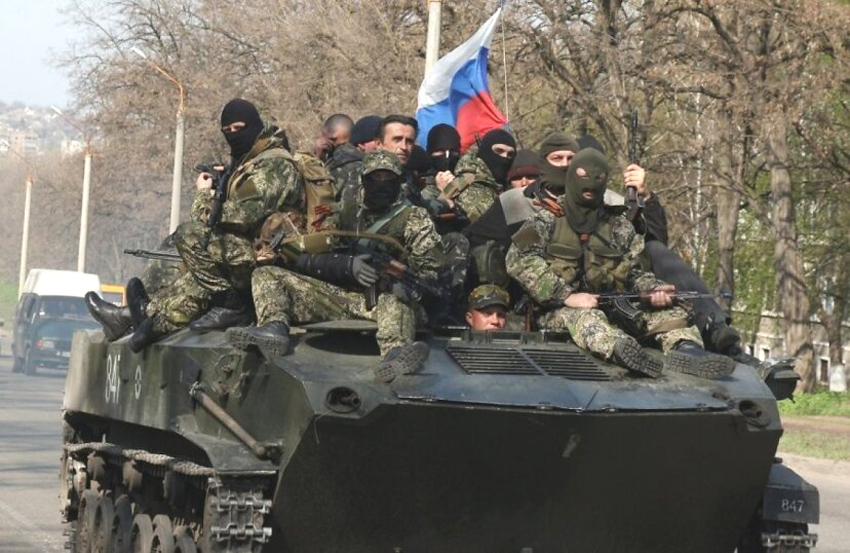NATO has officially declared Russia the ‘most significant and direct threat’ to the security of its members. This marks a radical strategic shift spurred by the Russian military offensive against Ukraine.
In a document that defines the alliance’s strategic outlook for the next decade, titled Strategic Concept 2022, NATO said Russia’s military offensive against Ukraine ‘has shattered peace and gravely altered our security environment.’
‘The Russian Federation is the most significant and direct threat to Allies’ security and to peace and stability in the Euro-Atlantic area,’ the 30-member NATO said in the text.
Russia ‘uses conventional, cyber and hybrid means against us and our partners. Its coercive military posture, rhetoric and proven willingness to use force to pursue its political goals undermine the rules-based international order,’ read the document, which was released on Wednesday, the second day of a NATO summit held in Madrid, Spain.
The military bloc also said members had decided to increase their military presence in Europe in response to Russia’s offensive against Ukraine, even though Moscow has repeatedly cited the Western military alliance’s eastward expansion as a security concern.
The last such document, published in 2010, had described Russia as a ‘strategic partner’.
Separately, NATO Secretary-General Jens Stoltenberg called the Russian offensive ‘the greatest security crisis in Europe since the Second World War’.
Since the onset of Russia’s ‘special military operation’ in Ukraine on February 24, the United States and its European allies have unleashed a flood of advanced weapons into the ex-Soviet country, to help its military fend off Russian forces and imposed waves of unprecedented sanctions against Moscow.
Russia has said that the Western flood of weapons into Ukraine and the sanctions would prolong the ongoing war.
NATO formally invited Sweden and Finland to join the US-led military alliance on Wednesday, in a historic expansion of the 30-member bloc, triggering strong reaction from Russia that called it ‘a purely destabilising factor’.
Finland and Sweden, historically non-aligned states, have also cited the war to seek membership in NATO.
The US-led military bloc approved the applications of the two Nordic countries in a collective decision, which was denounced by the Kremlin as a ‘destabilising move’.
Earlier, Turkey had been objecting to Finland and Sweden’s accession, saying the pair were sheltering members of the Kurdistan Workers Party (PKK), a group deemed terrorist by Ankara. However, on Tuesday and after intense talks by the top leaders of Sweden, Finland, and Turkey, Ankara dropped its objection.
According to Stoltenberg, Finland and Sweden have agreed to a ‘further amending their domestic legislation’ to give Turkey the anti-terror reassurances it has sought, and would be ‘cracking down on PKK activities’ and ‘entering into an agreement with Turkey on extradition’.
The decision on the Nordic pair will now be referred to the parliaments and legislatures of the NATO member states for final ratification. The process is, however, likely to move swiftly. The NATO chief said he was ‘absolutely confident’ Finland and Sweden would become members quickly.
Elsewhere in his remarks, Stoltenberg said that NATO had been preparing for Russian aggression since 2014.
‘The reality is that we also have been preparing for this since 2014 because that’s the reason why we have increased our presence in the eastern part of the alliance, why NATO allies have started to invest more in defence,’ he said.
Earlier on Wednesday, US President Joe Biden said that NATO was more relevant today ‘than it ever has been,’ and that the alliance would be ‘strengthened in all directions across every domain — land, air and sea’.
- The United States has announced the delivery of $1.3 billion in economic aid to Ukraine, as the first part of the initial $7.5 billion approved by Congress last month.
The announcement was made on Wednesday by the US Treasury Department which aims to disburse the full $7.5 billion by the end of September.
In a statement, Treasury Secretary Janet L. Yellen said, ‘The Treasury Department, together with the State Department and USAID, continues to move swiftly to ensure that President Biden’s package of support, approved by Congress, will reach those in need as quickly as possible.’
The US has been supporting Ukraine both militarily and financially since February, when Russia began its offensive there.
Ukraine’s economy will contract by up to 45 per cent in 2022, with no diplomatic off-ramp on the horizon to end the five-month conflict, according to estimates by the World Bank.
According to the Treasury Department, the G7 and the European Union also announced commitments of $29.6 billion in further money for Kiev, with $8.5 billion of that coming from the United States.
Also, the Treasury said in a statement that it had blocked $30 billion in assets of the Russian elite and officials, and immobilised $300 billion owned by the central bank, according to the Russian Elites, Proxies, and Oligarchs Task Force (REPO) of the US Treasury Department.
The United States and Ukraine’s other Western allies have been giving Kiev millions of dollars in modern weaponry.
Washington alone has supplied Ukraine with more than $6 billion in military equipment.
Russia has repeatedly warned against the West’s plans to pump weapons into Ukraine, saying the more weapons arrive in the country, the longer the war will last.
Russian Ambassador to Washington, Anatoly Antonov, said earlier this week that the move ‘only tightens the conflict spiral and increases the threat of further escalation with unpredictable consequences.’
Antonov accused Washington of ‘pushing the Kiev regime to commit mass murders of civilians’.
Biden has previously said that Russia’s offensive in Ukraine would end through diplomacy, but Washington must provide significant weapons and ammunition to Kiev for the highest leverage at the negotiating table.
